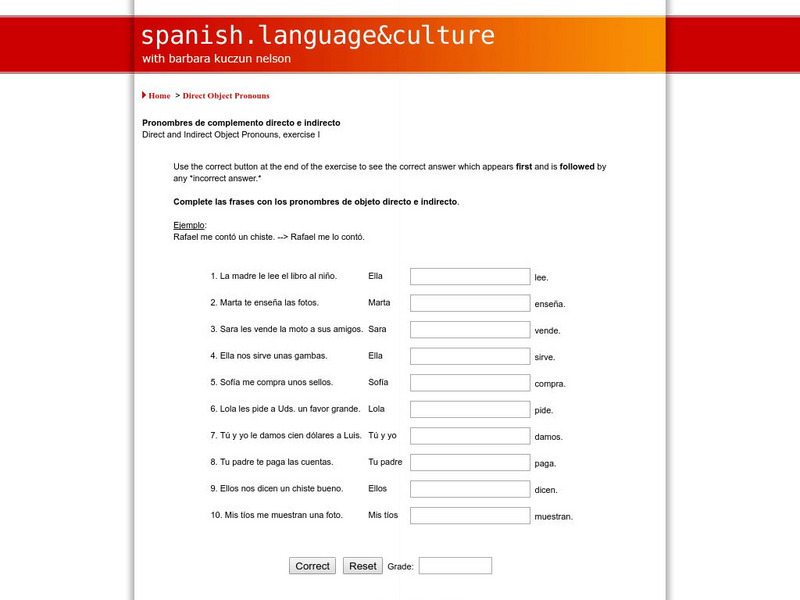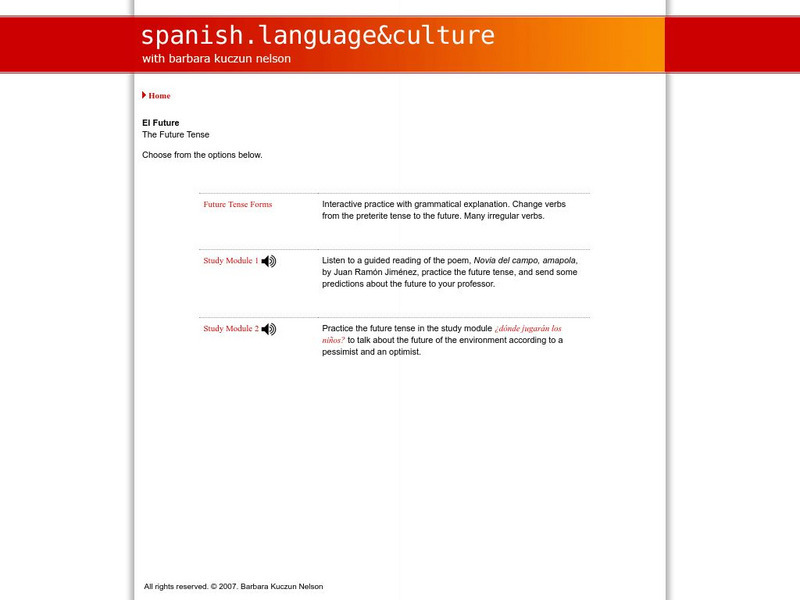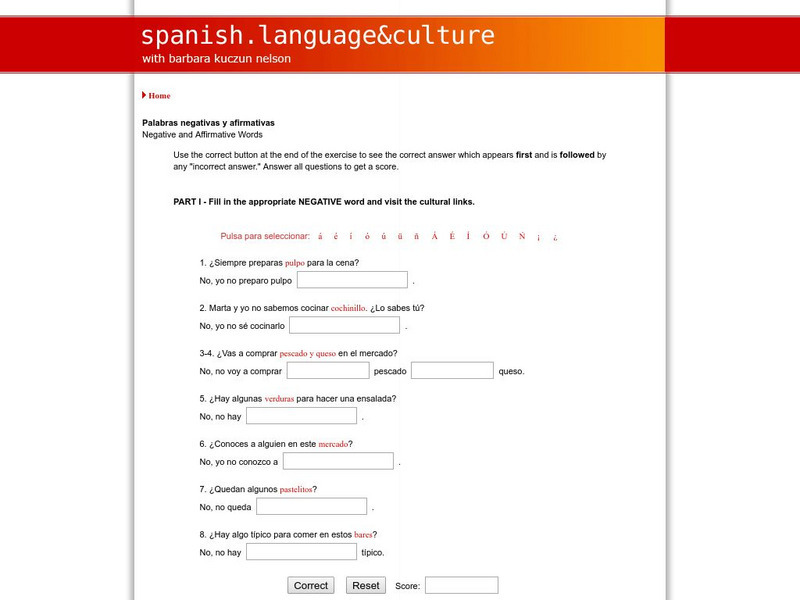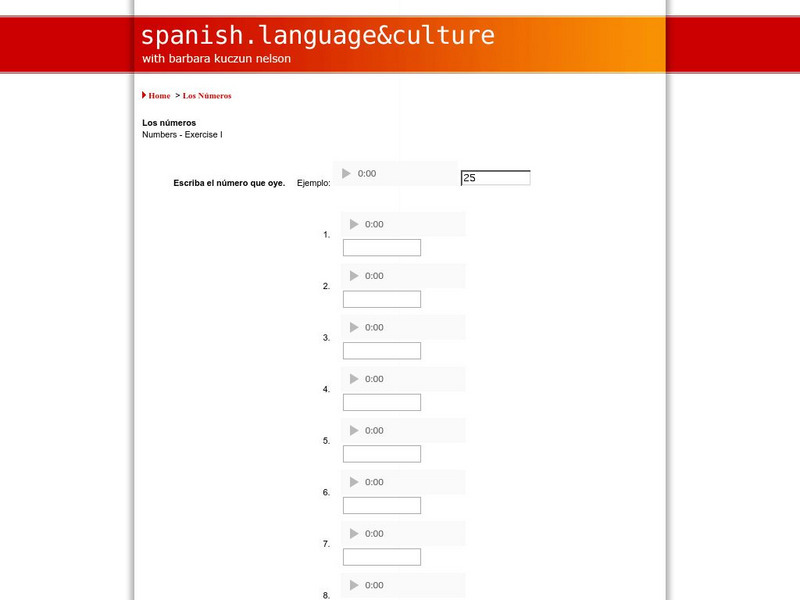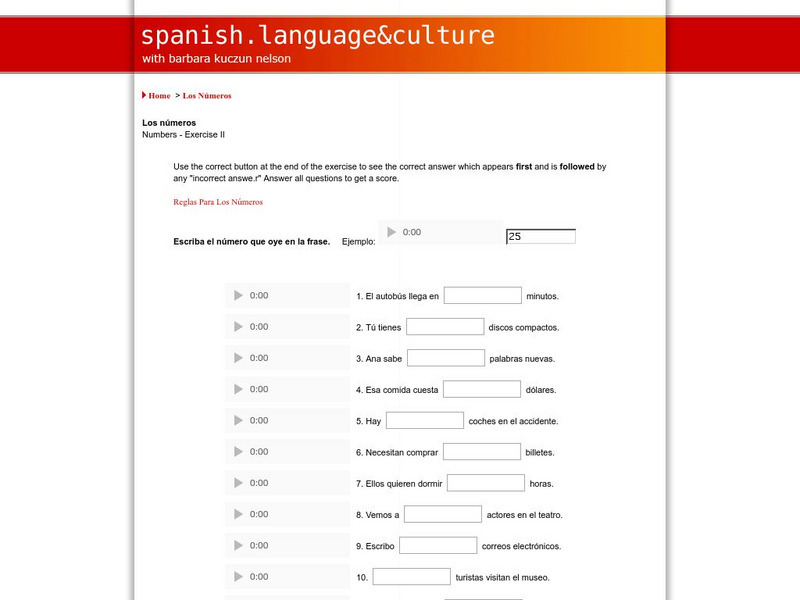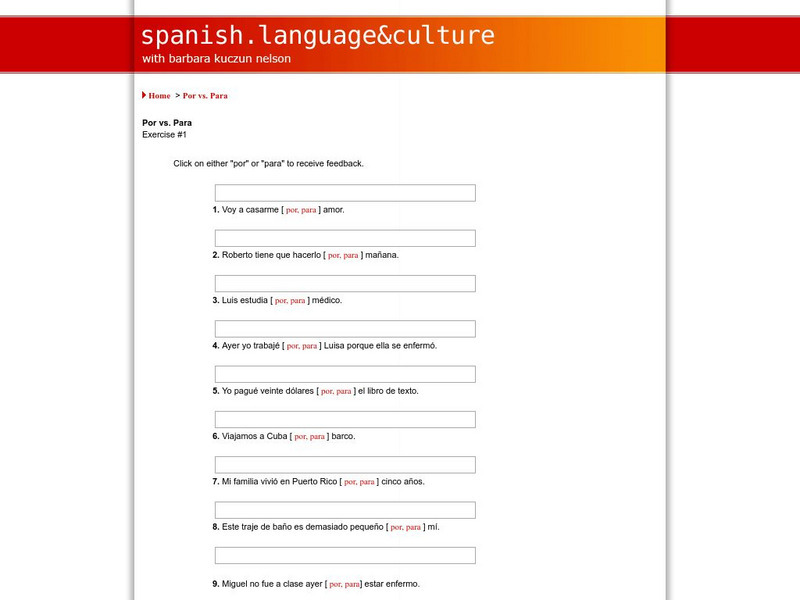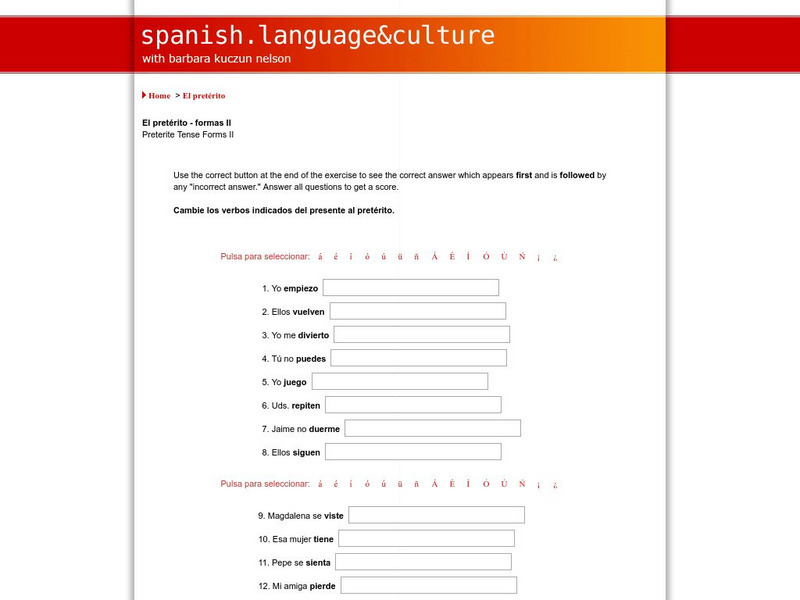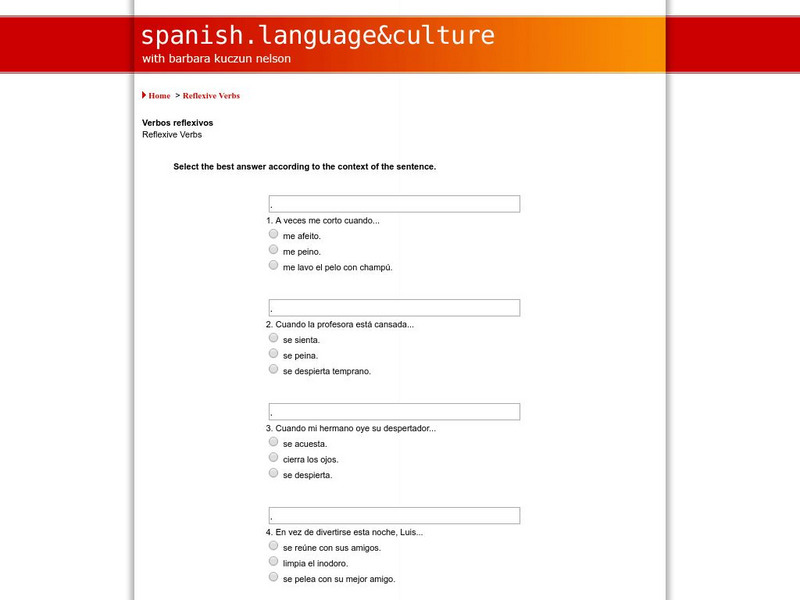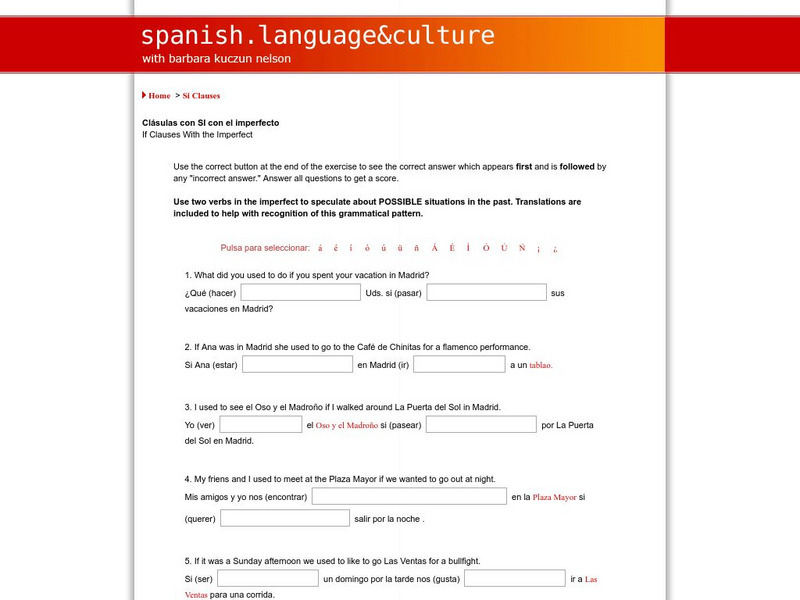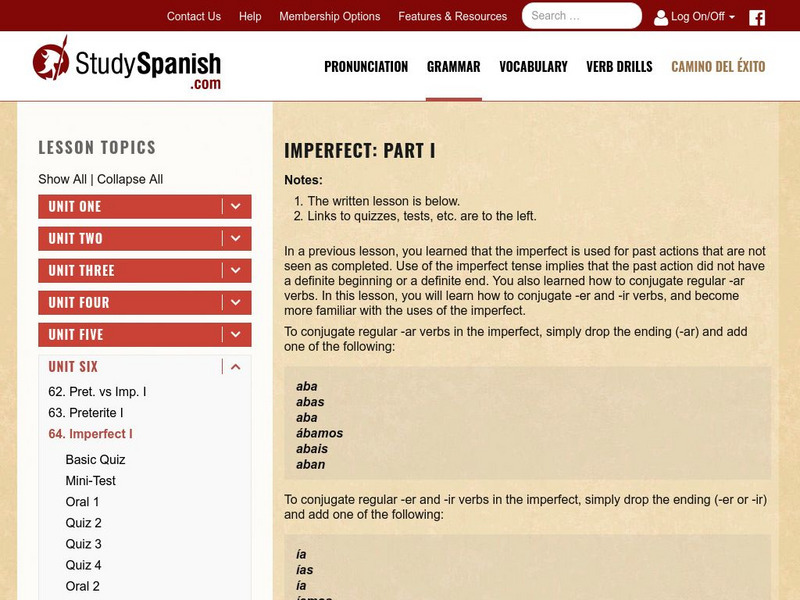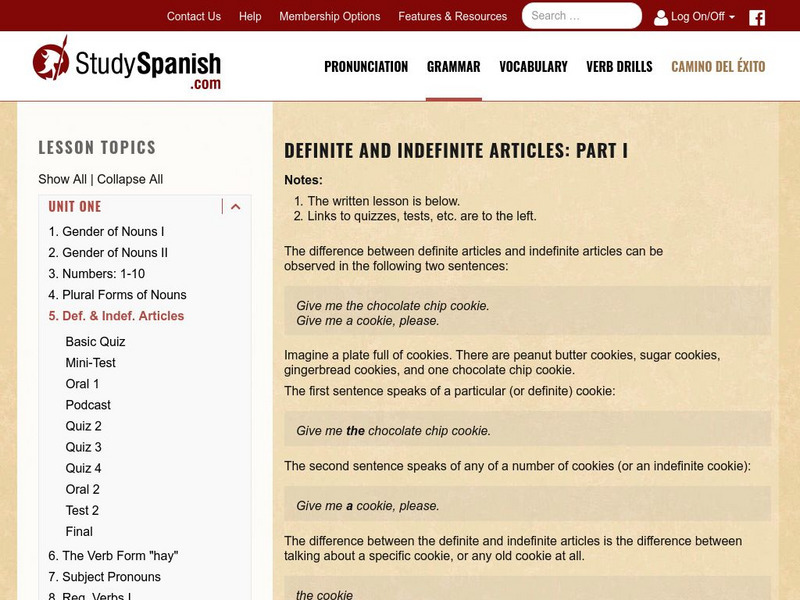Colby College
Spanish Language & Culture: Demonstrative Adjectives
Online exercises with demonstrative adjectives and brilliant photos to help in answering the fill-in-the blanks.
Colby College
Spanish Language & Culture: Direct and Indirect Pronouns (Part 2)
This online exercise is from the Colby College for practicing the substitution of pronouns for the direct and indirect objects of a sentence, and for using the two pronouns together in the same sentence. A brief English introduction...
Colby College
Spanish Language & Culture: Direct and Indirect Pronouns (Part 3)
This online exercise from the Colby College for practicing the substitution of pronouns for the direct object of a sentence, and for using the direct and indirect object pronouns together in the same sentence. A brief English...
Colby College
Spanish Language & Culture: Direct Object Pronouns (Part 2)
This online exercise is from Colby College for practicing direct object pronouns and the present indicative tense. A brief English explanation of a direct object pronoun introduces the lesson.Students follow an English translation to...
Colby College
Spanish Language & Culture: The Future Tense
Colby College provides a great explanation of how to conjugate verbs in the future tense, with English translations of the examples. Twenty sentences provide fantastic practice in changing verbs from preterite tense to future tense...
Colby College
Spanish Language & Culture: Que Hora Es? #1
Listen to each time given in Spanish and type in (numerically) the time that you hear. Great practice for telling time in Spanish. At the end of the exercise the student can compare his responses with the correct answers.
Colby College
Spanish Language & Culture: The Future of the Environment
Colby College offers exercises on the future of the environment from the perspectives of an optimist and of a pessimist provide great practice with the future tense.
Colby College
Spanish Language & Culture: Negative and Affirmative Words
Colby College offers a fill in the blank exercise that gives the user practice in determining which negative or affirmative word to use. Photos of new food vocabulary words are also accessible by clicking on the underlined word.
Colby College
Spanish Language & Culture: Rules for Numbers
Brief, useful explanation on how to use Spanish numbers.
Colby College
Spanish Language & Culture: Numbers 1 100 (Part I)
Great listening comprehension practice with the Spanish numbers 1-100. Write the numerals for the number you hear and check your answers.
Colby College
Spanish Language & Culture: Numbers 1 100 (Part Ii)
Great listening comprehension practice with the Spanish numbers 1-100 from the Colby College. Write the numerals for the number you hear in the sentence and check your answers.
Colby College
Spanish Language & Culture: #2 "Por" or "Para"
Choose "por" or "para" to complete each sentence. Pass the cursor over the highlighted preposition to check your answer and to get an explanation of its use.
Colby College
Spanish Language & Culture: The Present Perfect Tense
Review examples and then complete three online exercises dealing with the present perfect tense. English translations are provided for some of the examples. The first exercise provides verb infinitives as cues for the present perfect...
Colby College
Spanish Language & Culture: El Preterito Formas (Part 2)
These exercises review irregular verbs, stem-changers, and spelling changes in the preterite tense. Conjugate verbs to match the subject. Answers may be checked and corrected.
Colby College
Spanish Language & Culture: Spanish Reflexive Verbs Exercises
This site is great practice from Colby College with some of the more common reflexive verbs. This exercise is not as concerned with testing grammatical applications as it is with testing for the meaning of the reflexive verb in context....
Colby College
Spanish Language & Culture: Reflexive Verbs in Song
Complete the lyrics of a song with a variety of reflexive constructions. A great way to review some basic reflexive verbs and become familiar with other reflexive verbs that are not so basic.
Colby College
Spanish Language & Culture: Si Clauses With the Imperfect
This site from the Colby College provides a great explanation of "if" clauses and the imperfect tense. The exercise provides great practice with the imperfect past. Answers may be checked and corrected.
Colby College
Spanish Language & Culture: Subjunctive Verbs of Doubt
A Spanish word bank of verbs of doubt is used to complete Spanish translations of the main clause. The student practices conjugating these verbs in the present indicative tense. Answers may be checked and corrected. The present...
Study Languages
Study Spanish: Formation of Adverbs
Great explanation of adverbs and how they are formed in Spanish. Some of the most common adverbs are listed in this lesson. A quiz at the end of the lesson tests the student's mastery of this grammar principle.
Study Languages
Study Spanish: Cardinal Numbers: 1 10
This site is a lesson on the cardinal numbers 1-10 with an explanation of how to change the number one to match the nouns it modifies. A quiz follows the lesson to test the student's comprehension of these cardinal numbers.
Study Languages
Study Spanish: Cardinal Numbers: 31 1000
This site is a lesson on the cardinal numbers 31-1000 with an explanation of how to change the hundreds to match the nouns they modify.A quiz follows the lesson to test the student's comprehension of these cardinal numbers.
Study Languages
Study Spanish: Imperfect Part I
Excellent introductory lesson to the regular conjugations of the imperfect tense and the main rules that govern its usage. Examples in Spanish and English illustrate specific rules. A quiz at the end of the lesson tests the student's...
Study Languages
Study Spanish: Definite and Indefinite Articles
This site has an introduction on definite and indefinite articles. Examples in Spanish and English illustrate the difference between a definite and an indefinite article. Singular and plural forms are presented. Students may test their...
Study Languages
Study Spanish: Comparisons of Inequality
This site is an online lesson on comparisons of inequality, using "mas" and "menos" with adjectives, adverbs, and nouns. A great explanation of when to use "de" and "que" with numbers. The lesson is thorough and easy to understand, with...



